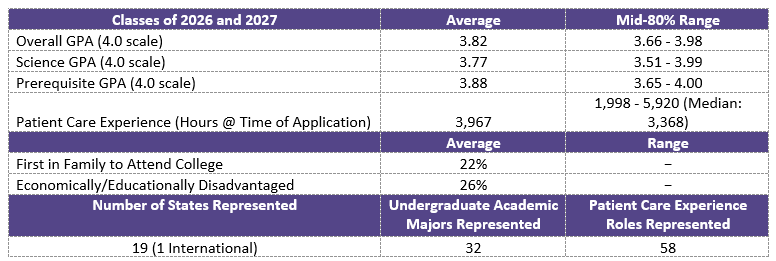Program Goals
After completion of our 24-month program, graduates from the Northwestern PA Program will be educated in a model which promotes collaborative, patient-centered, evidence-based, and culturally appropriate health care to diverse populations. Our goals, measures, rationale, and outcomes are provided below:
Goal 1Matriculate a qualified cohort of students from a variety of backgrounds.
Matriculate a qualified cohort of students from a variety of backgrounds.
Rationale: The NU PA Program consists of an academically rigorous curriculum. Because we focus on a team-based approach, we understand the need to matriculate not only academically strong PA students, but also value a broad variety of life experiences in our admissions process.
Outcome measure: Matriculant data representing, for example, strong academic backgrounds and a variety of health care experiences.
Actual Outcome: For the classes of 2026 and 2027, we had 19 states represented, an international presence, and a variety of academic majors and patient care experience roles.
Goal 2Prepare graduates with the medical knowledge and skills to enter clinical practice.
Prepare graduates with the medical knowledge and skills to enter clinical practice.
Rationale: The NU PA Program has a responsibility to provide an exceptional education to our students and prepare them for clinical practice. The program incorporates program competencies guided by our four PA organizations (AAPA, PAEA, NCCPA and ARC-PA). The didactic and clinical phases of our curriculum are evaluated on an ongoing basis using data from courses, assessments, and evaluations.
Outcome measure: Five-year first-time PANCE pass rate that meets or exceeds the national average.
Actual Outcome: The Northwestern University PA Program 5-year (2021-2025) first-time PANCE pass rate is 97% compared to the national average of 93%.
Goal 3Prepare graduates to collaborate on interprofessional teams in providing patient-centered care.
Prepare graduates to collaborate on interprofessional teams in providing patient-centered care.
Rationale: An interprofessional approach to healthcare improves patient care and outcomes. The PA program is committed to providing these experiences to each of our students during their education to best prepare them for clinical practice.
Outcome measures: PA students will have opportunities to learn about, from, and with other health care professionals in interprofessional teams throughout their NU PA Program education.
Actual Outcomes:
- Students are required to participate in longitudinal IPE activities throughout their didactic and clinical phases of the curriculum. The students learn about and with other health professions students including, but not limited to MD/DO, nursing, physical therapy, genetic counseling, and prosthetics/orthotics.
- Students are required to participate in the Education Centered Medical Home (ECMH) clinical experiences with the medical students. Each student is assigned to a specific clinic for a longitudinal experience throughout their 2-years in the program. The students work in teams with M 1-4 medical students and physician preceptors to provide care to patients.
- Students are required to participate in the Synthesis & Application Modules curriculum with the medical students.
- Students complete on average 60-70% of their clinical rotations in an academic health center where they are placed on the same services as learners from other programs within the Feinberg School of Medicine as well as visitors from other medical institutions.
- Guest instructional faculty come from a variety of professional backgrounds including but not limited to allopathic/osteopathic physicians, PAs, APNs, genetic counselors, physical therapists, pharmacy, and prosthetics/orthotics professionals.
